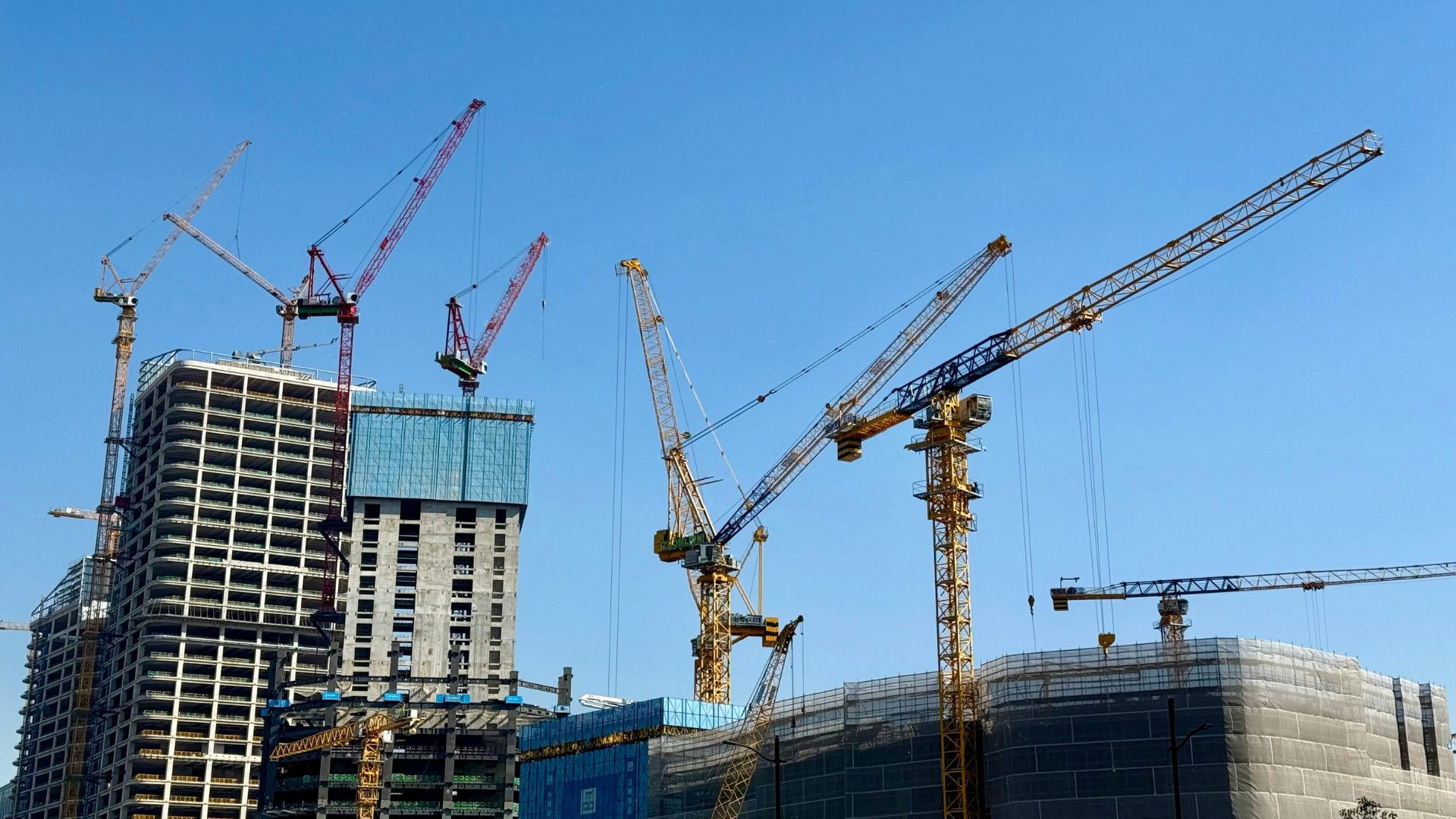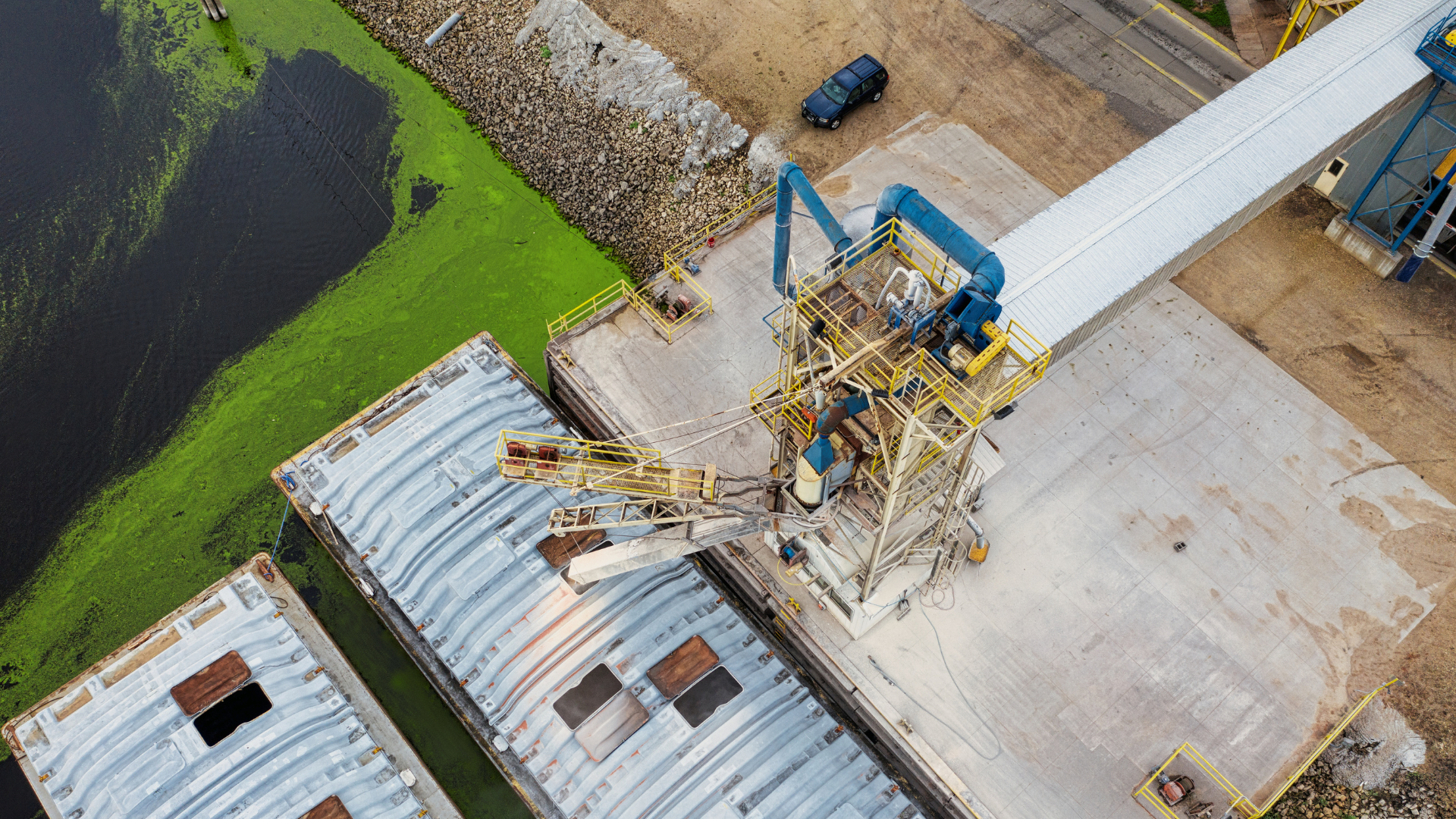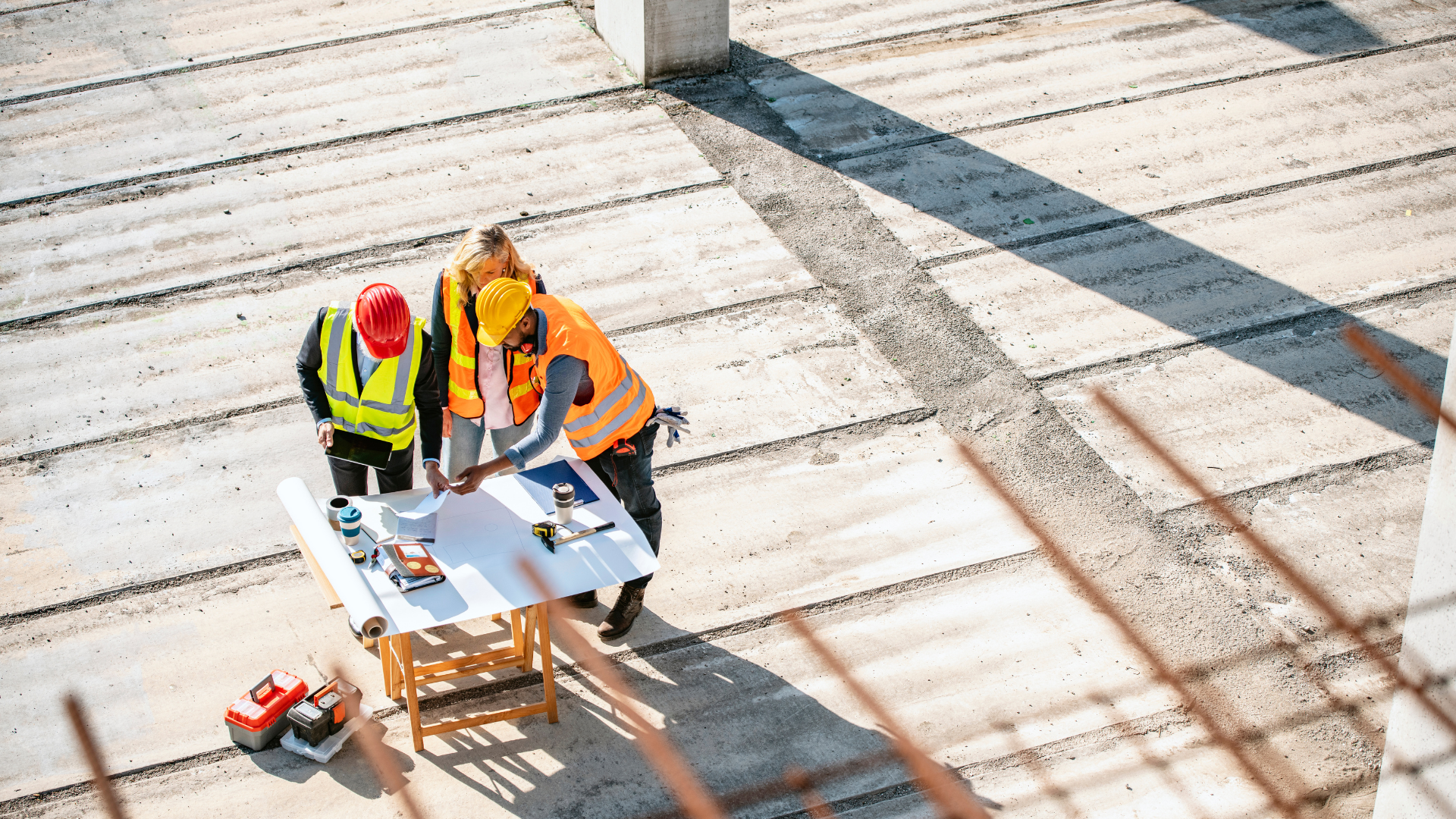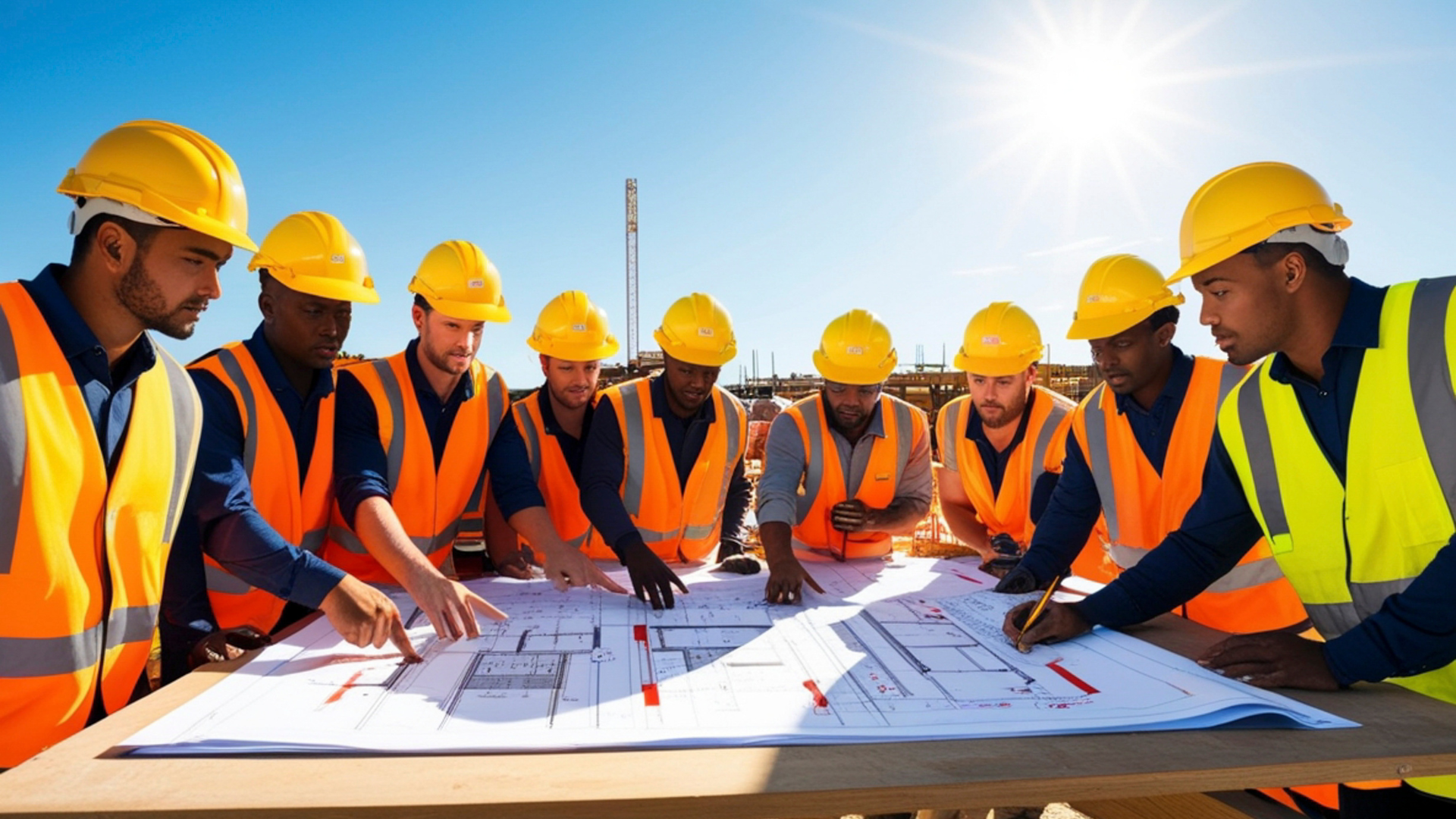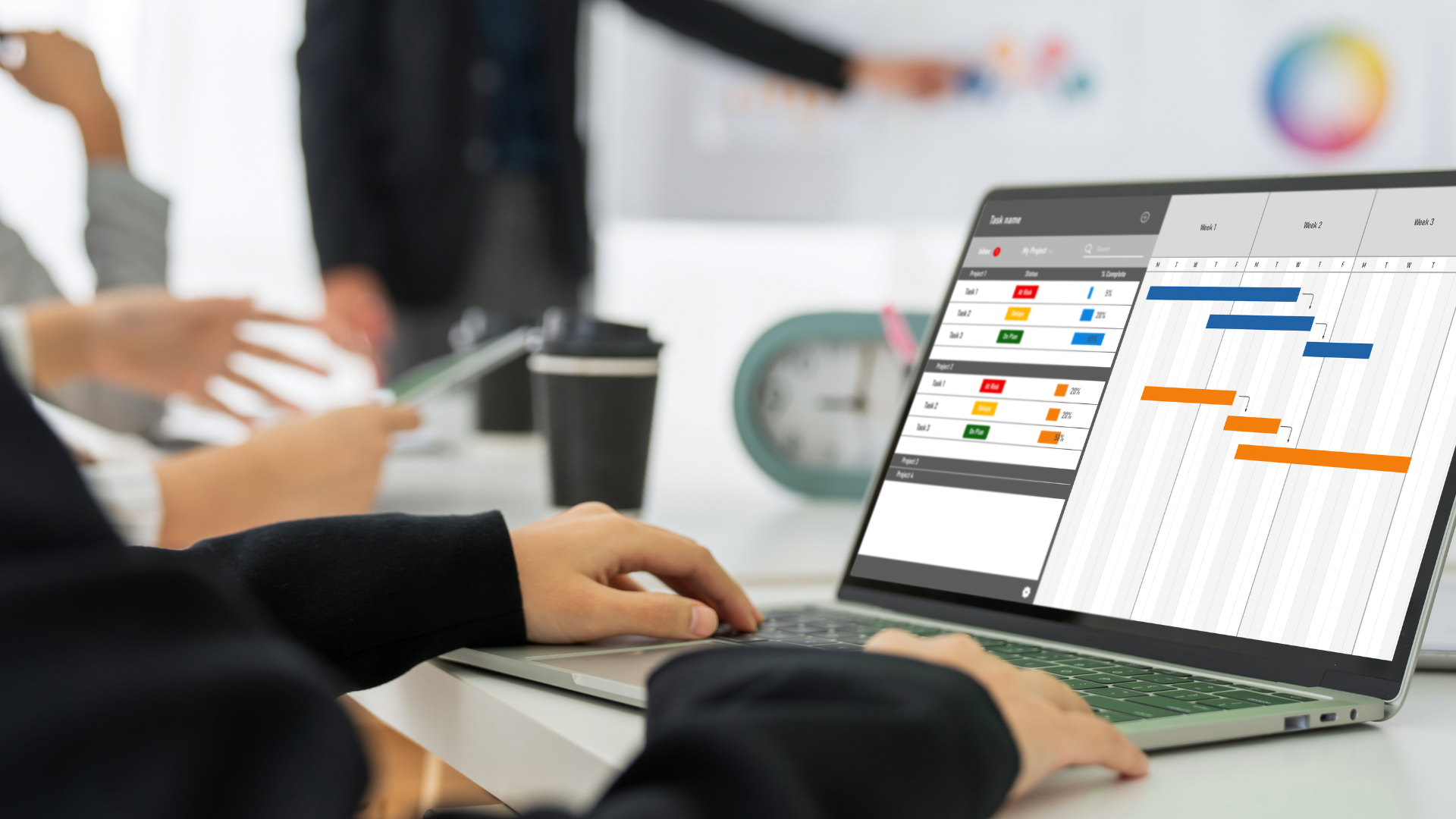In construction, the work doesn’t just speak for itself. The way clients feel throughout the project matters just as much.
Ever had a client call saying, “Hey, just checking in… again?” That’s usually a sign something’s missing: clear updates, quick replies, or simply the reassurance that things are moving forward.
That’s where the hero quietly enters, A Good Construction CRM. It doesn’t shout. It ensures your clients aren’t left guessing, waiting, or wondering what’s next.
Let’s talk about how simple CRM strategies can make clients feel like they matter because they do.
Key Takeaways
- Client Relationships: Strong communication is key to client satisfaction in construction.
- Pitfalls Without CRM: Clients start to feel ignored, details slip, clients keep repeating themselves, personalization gap, etc.
- How CRM Enhances Client Relationship: Regular client updates, faster response time, proactive problem solving, consistent team communication, etc
- Best CRM's: Constructionbase, Procore CRM, JobNimbus CRM.
- Choosing CRM: Select a mobile-friendly, construction-specific CRM that integrates well.
The Human Side of Construction: Why Relationships Matter
In construction, you are not just building structures but also being a part of someone’s big moment. A first home. A growing business. A fresh start. It’s personal.
That’s why the relationship matters just as much as the work itself.
A while back, a contractor shared this:
“We built the perfect home, but what the client remembered most? That we answered her texts within minutes.”
That says everything.
Fun Fact: 56% of customers would pay extra for a product if it means receiving excellent customer support.
The clients are not asking for much. They are asking:
- “Are you listening?”
- “Can I count on you?”
- “Do you actually care?”
When the answer is yes, everything else gets easier:
- Communication becomes natural
- Misunderstandings get fewer
- Trust builds faster
- And happy clients bring more happy clients
Read our recent blog about CRM: Streamlining Project Workflows with Advanced Construction CRM Tools.
Common Relationship Pitfalls in Construction Projects (Without CRM)
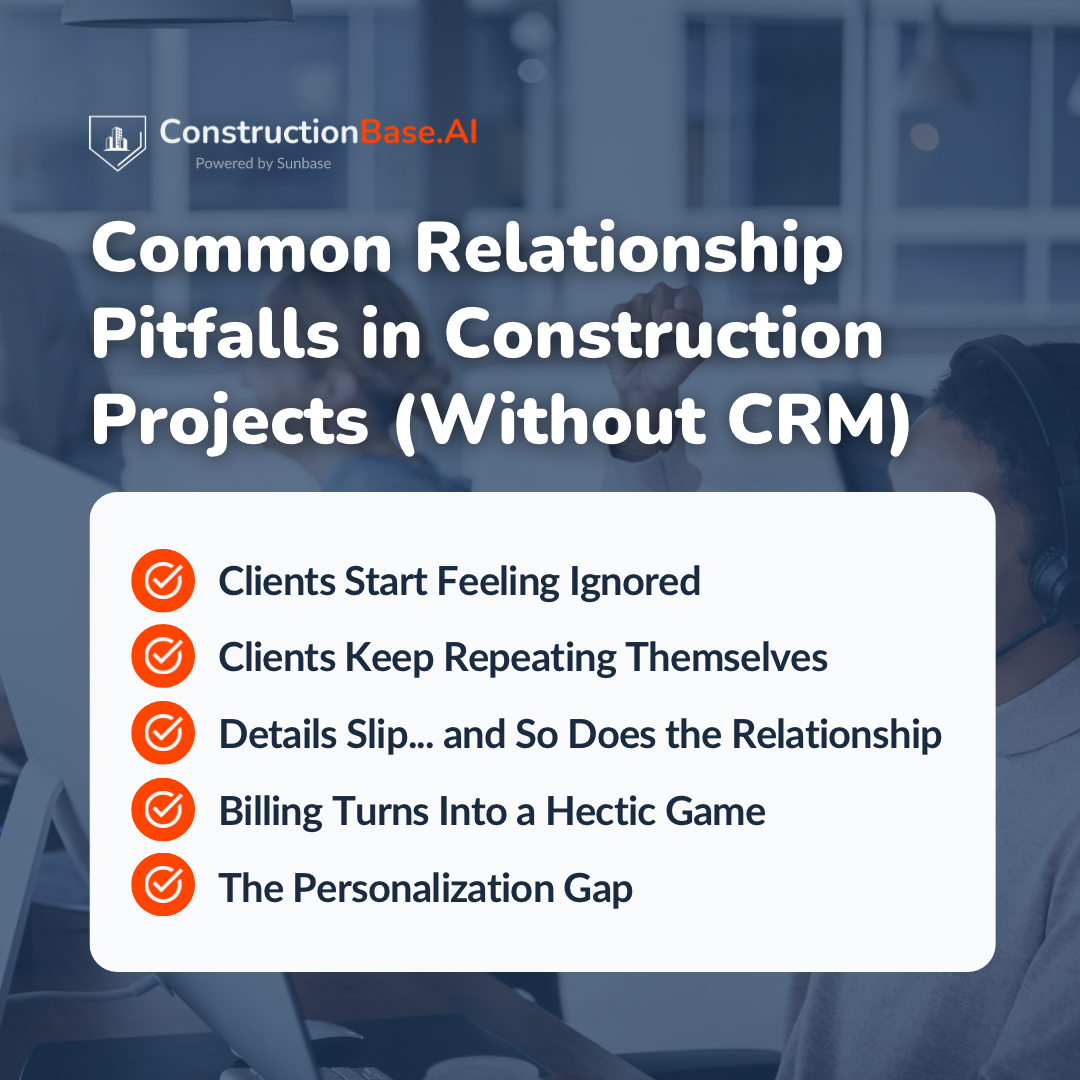
1. Clients Start Feeling Ignored (Even When You Are Working Hard)
You are on-site, coordinating five things at once. Without a CRM, following up with the client slips through the mind.
But the client? They start wondering…
- “Are they still working on this?”
- “Why haven’t I heard anything?”
- “Do they even remember I exist?”
And that little bit of doubt? It grows fast. Silence becomes the biggest issue in the relationship.
Did you know? 68% of customers have switched providers due to poor service, with communication issues being a primary driver
2. Clients Keep Repeating Themselves
You know what drives people nuts? Saying the same thing… three times… to three different people.
“I already told your team that on Monday.”
The core issue? Poor internal communication.
The client feels it fast when your team isn’t on the same page.
No CRM means scattered info, missed messages, and repeated conversations.
And guess who ends up doing the reminding? The client. Again.
This makes them feel like no one’s really listening or, worse, that they are not important enough to be remembered.
79% of customers expect consistent interactions across departments, but 55% feel like they are talking to separate teams. (Source)
3. Details Slip... and So Does the Relationship.
“That’s not the tile I picked.”
Oof. One small detail, one big dent in the relationship.
The little things slip when there’s no CRM keeping track of selections, notes, and conversations. And in construction? Little things matter a lot.
The real issue? No clear record.
No record = wrong choices, surprise rework, and awkward client calls.
And when clients keep having to remind you what they said… to them, it stops feeling like their project is in good hands.
Remember: Lack of centralized project data causes many problems, such as miscommunication, delays, cost overruns, conflicts, and rework, all of which negatively impact project outcomes and client relationships.
4. Billing Turns Into a Hectic Game
Surprise charges. Confusing breakdowns. Missing quotes.
Without a CRM tracking all the financial details, billing becomes a back-and-forth of “wait, what was agreed upon again?”
The client starts asking:
- "Is this what we talked about?"
- "Why is this higher than the original estimate?"
- "Who approved this change?"
These surprise costs can break the trust between you and your clients, leaving them skeptical about future projects with you.
5. The Personalization Gap: When Clients Feel Overlooked
Without a CRM to track each client’s quirks, preferences, and must-haves, delivering a truly personalized experience quickly becomes tricky.
When the little details that make a project theirs get overlooked, excitement fades into disappointment.
Clients don’t just want a finished project. They want their vision, their style, their dream brought to life.
Without that personal touch, it stops feeling special and starts feeling like just another build.
And just like that, you have a client quietly thinking about hiring someone else next time.
DID YOU KNOW: 70% of consumers expect every representative they talk to at a company to be aware of their purchase history and past interactions.
What Do We Learn?
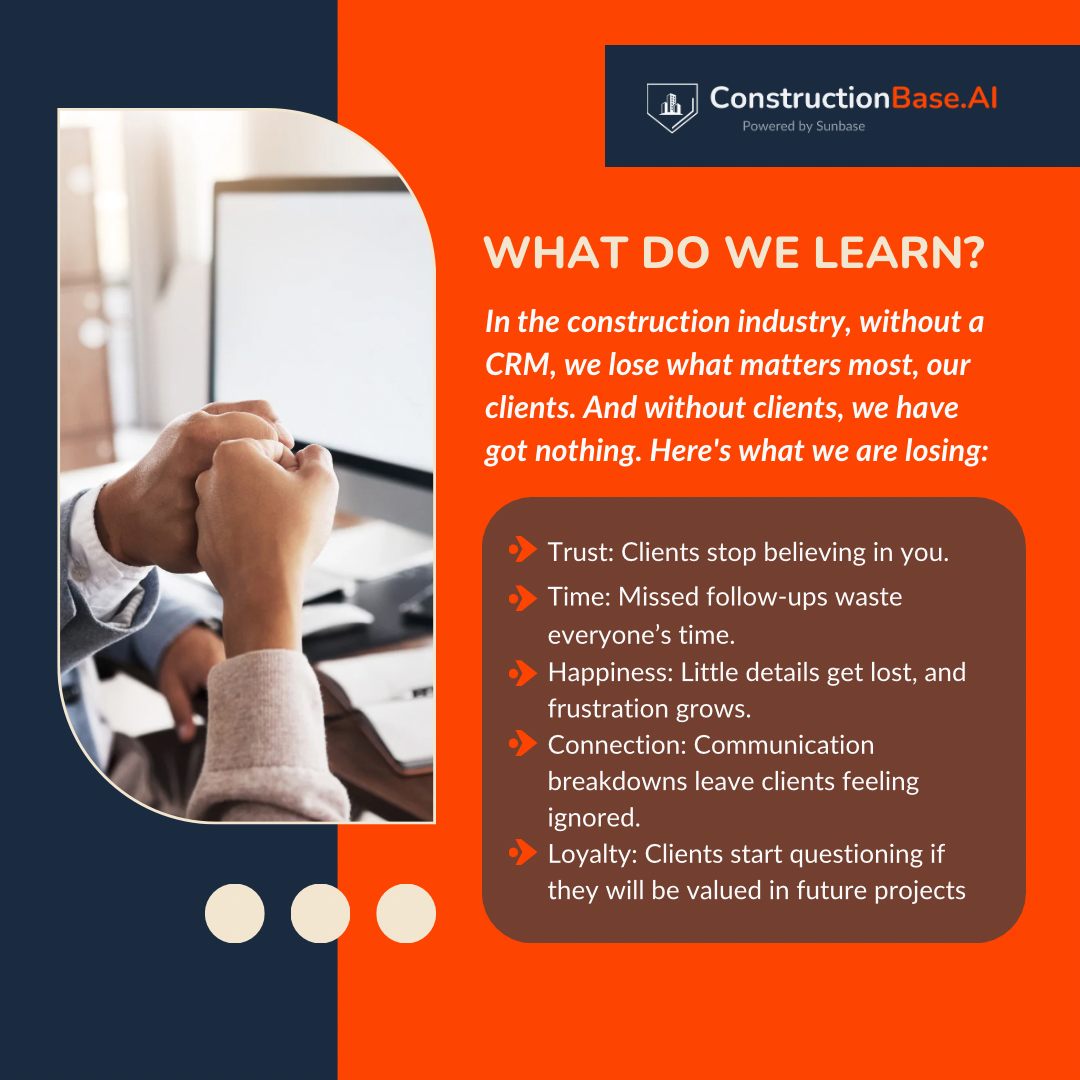
In the construction industry, without a CRM, we lose what matters most, our clients. And without clients, we have nothing. Here's what we are losing:
- Trust: Clients stop believing in you.
- Time: Missed follow-ups waste everyone’s time.
- Happiness: Little details get lost, and frustration grows.
- Connection: Communication breakdowns leave clients feeling ignored.
- Loyalty: Clients start questioning if they will be valued in future projects
- Business: Repeat work becomes harder to land.
- Reputation: Bad experiences spread quickly.
So, what exactly is Construction Customer Relationship Management (CRM) Software?
Let me explain in easy words.
Construction CRM software is built for construction companies to manage client relationships, track project details, organize communication, and keep everything in one place.
It helps teams stay connected with clients, avoid mistakes, and deliver a smoother, more professional experience.
The construction CRM market is set to grow significantly, reaching over $9.2 billion by 2033. This growth is due to businesses' increasing use of cloud-based CRM tools, the need for better customer management, and the complexity of construction projects.
Learn: The Overlooked Benefits of CRM for the Construction Industry
Enhancing Client Relationships with Construction CRM Strategies
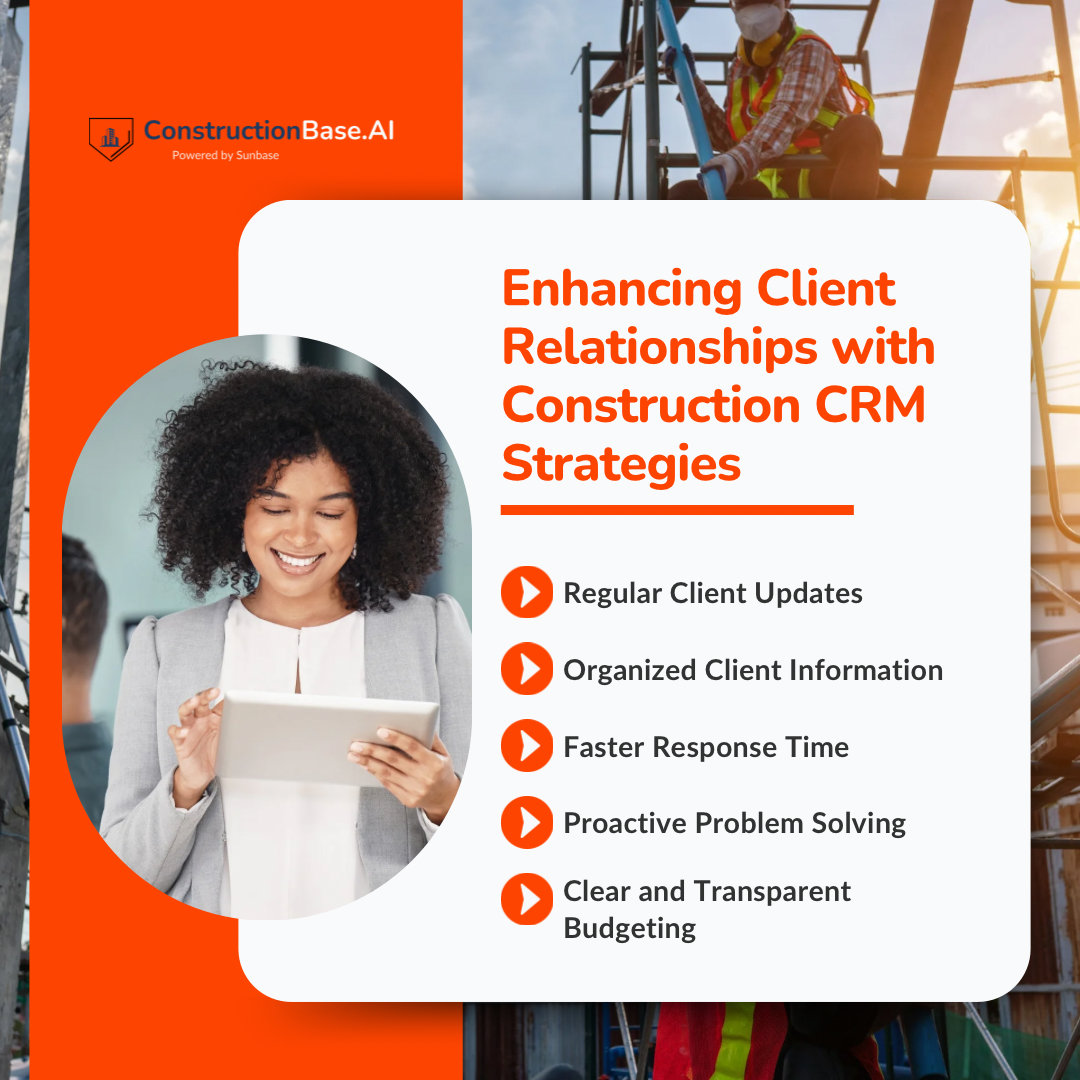
1. Regular Client Updates
A good Construction CRM helps you automate updates like “foundation completed,” “inspection scheduled,” or “materials delivered.”
Instead of waiting and wondering, clients get updates that show real progress.
This keeps clients happy, reduces anxiety, and saves your team from constant check-in calls.
2. Organized Client Information
Never forget a client's preferences, historical data, requests, or important project details.
A CRM stores everything in one place: conversations, selections, signed documents, and notes.
When a client asks about a previous request, your team can find it in seconds, not hours.
Clients feel important because you remember even the little things they care about.
3. Faster Response Times
A CRM flags open messages, pending approvals, and unanswered client questions in one easy view.
Instead of emails getting buried, the right team member sees it and responds quickly.
When clients get quick answers, they feel respected, and that’s a major part of customer satisfaction.
4. Proactive Problem Solving
Problems happen in every project: weather delays, material shortages, schedule shifts.
A CRM gives you a full view of project timelines and risks early on.
Instead of reacting when a client complains, you can first reach out, explain the issue, and offer solutions.
Clients don’t expect perfection, but they respect honest, upfront, and proactive companies.
5. Clear and Transparent Budgeting
Money is always a sensitive topic in construction projects.
A Construction CRM tracks every cost estimate, invoice, change order, and payment status in one place.
Clients can easily see what they are being charged for, where their money is going, and how changes affect the final cost.
When clients feel the numbers are clear and fair, trust grows and billing disputes shrink.
6. Consistent Team Communication
In construction, different teams often handle different parts: sales, project management, and on-site crew.
When teams communicate separately, clients get conflicting answers. A Construction CRM keeps everyone aligned on project details, preferences, and next steps.
A unified team makes clients feel like they are working with one company, not a disorganized group.
7. Automated Scheduling and Reminders
A CRM automates scheduling of meetings, inspections, and approvals.
Clients and teams receive reminders so important dates aren’t missed or forgotten.
A consistent schedule builds client confidence and keeps projects on track.
8. Easy Change Order Management
Clients often request changes mid-project, and a CRM organizes every update neatly.
Change orders show costs, impacts on schedule, and approvals in one place.
Clients appreciate seeing exactly how their changes affect the project, without confusion or hidden costs.
9. Warranty and Service Tracking
After a project's completion, a CRM can track warranty periods, service agreements, and maintenance schedules.
Clients get timely notifications if a warranty is nearing its end or scheduled maintenance is due.
Proactive service after project completion shows long-term commitment and keeps clients loyal for future projects.
10. Encouraging Client Referrals
Happy clients are the best promoters for your business.
A Construction CRM tracks project satisfaction, milestones, and client feedback.
After a successful handover, it helps you send personalized thank-you notes and ask for referrals at just the right moment.
When clients feel valued and recognized, they are more likely to recommend your company to friends, family, and business partners.
11. Client Portals for Transparency
A Construction CRM gives clients a portal to see project progress, photos, documents, and timelines.
Clients don’t have to call or email for updates; they can check everything themselves.
This cuts down on back-and-forth and makes communication easier for everyone.
When clients can see real progress anytime, it builds trust and keeps them happy.
Check out: Top Features to Look for in Construction CRM Systems
Best Construction CRM To Enhance Customer Relationship Management
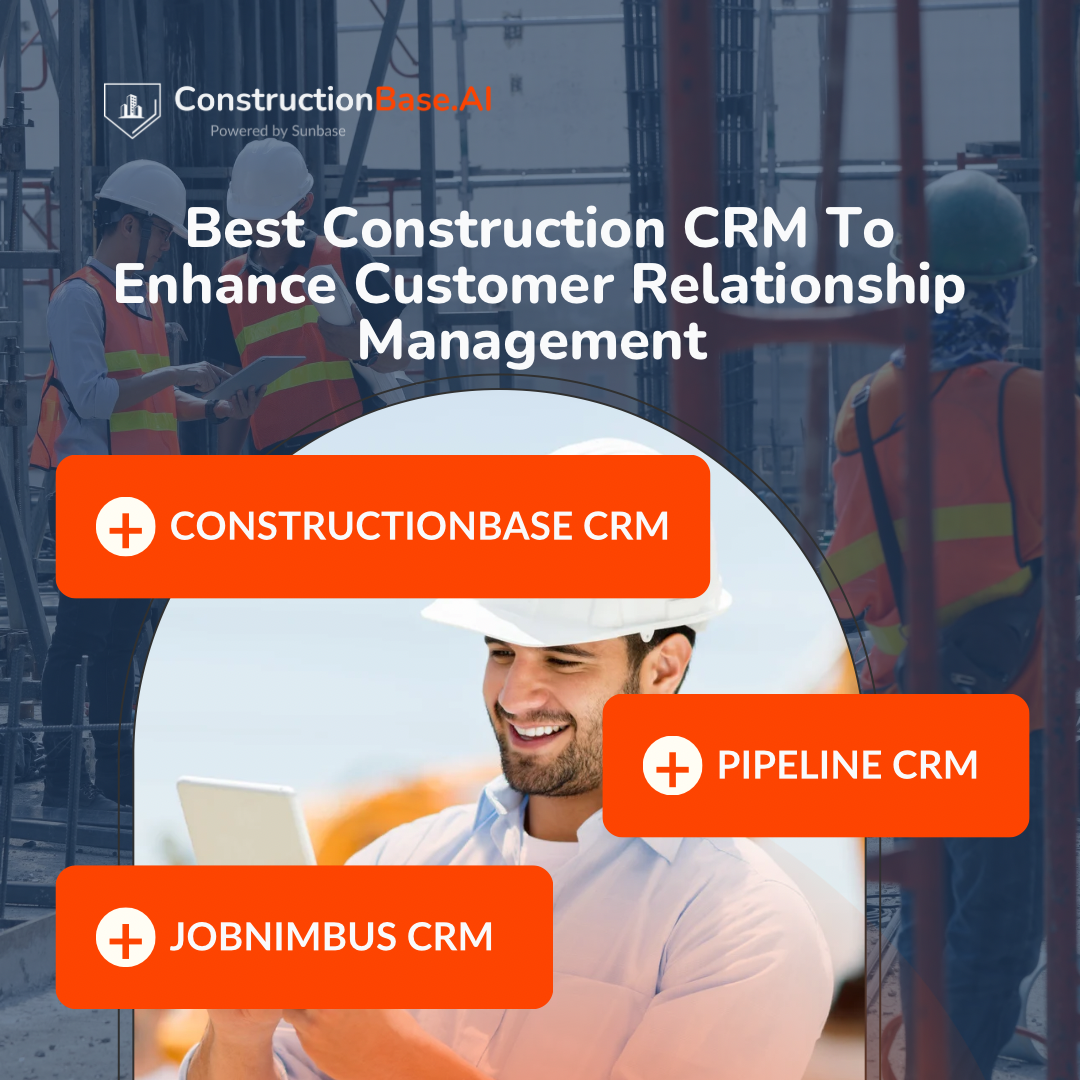
1. Constructionbase CRM
Constructionbase CRM is a powerful, all-in-one solution that streamlines client management, project tracking, and team communication. It ensures easy collaboration and stronger, more transparent relationships with every client.
Features enhancing client relationships:
- Client Hub: Store all client details and project info in one place for easy access and better service.
- Lead Tracking: Capture and track leads to convert prospects into loyal clients with smooth follow-ups.
- Project Tracking: Monitor real-time project progress to keep clients updated and on schedule.
- Automated Communication: Automate emails and updates to keep clients informed without extra effort.
- Proposal & Contract Management: Quickly generate and manage proposals and contracts for faster, smoother deals.
- Sales Pipeline: Visualize the sales process to focus on high-priority leads and build strong client relationships.
- Document Management: Store and organize important documents securely for easy client access.
- Analytics: Use data insights to improve strategies and enhance client satisfaction.
- Mobile Access: Access info anytime, anywhere, ensuring instant updates and seamless client interactions.
2. Pipeline CRM
Pipeline CRM helps strengthen customer relationships by tracking and managing every sales interaction, ensuring timely follow-ups and personalized engagement from start to finish.
Features enhancing customer relationships:
- Sales Pipeline Management: Keep track of deals and customer progress to follow up on time and stay personal.
- Lead Management: Get real-time updates on leads so you can respond quickly and build trust.
- File Storage: Store all customer files in one spot for fast access and better service.
- Mobile App and Offline Access: Keep in touch with customers anytime, anywhere, even without internet access.
3. JobNimbus CRM
JobNimbus CRM is a cloud-based platform designed for construction companies. It helps them manage and track leads, automate workflows, and improve customer management.
Features enhancing client relationships:
- Contact and Lead Management: Stores all customer and lead information in one place, making it easy to track interactions and follow-ups. It also organizes job details and past information to ensure you never forget a customer.
- Calendar Integration: Syncs with Google Calendar for seamless coordination between staff and clients.
- Reporting and Analytics: Provides insights into team performance, sales pipeline, and customer interactions to improve service.
CHOOSE THE BEST ONE FOR YOURSELF.
Don't miss out on: How Construction CRM Enhances Customer Relationships?
How To Choose The Right Construction CRM?
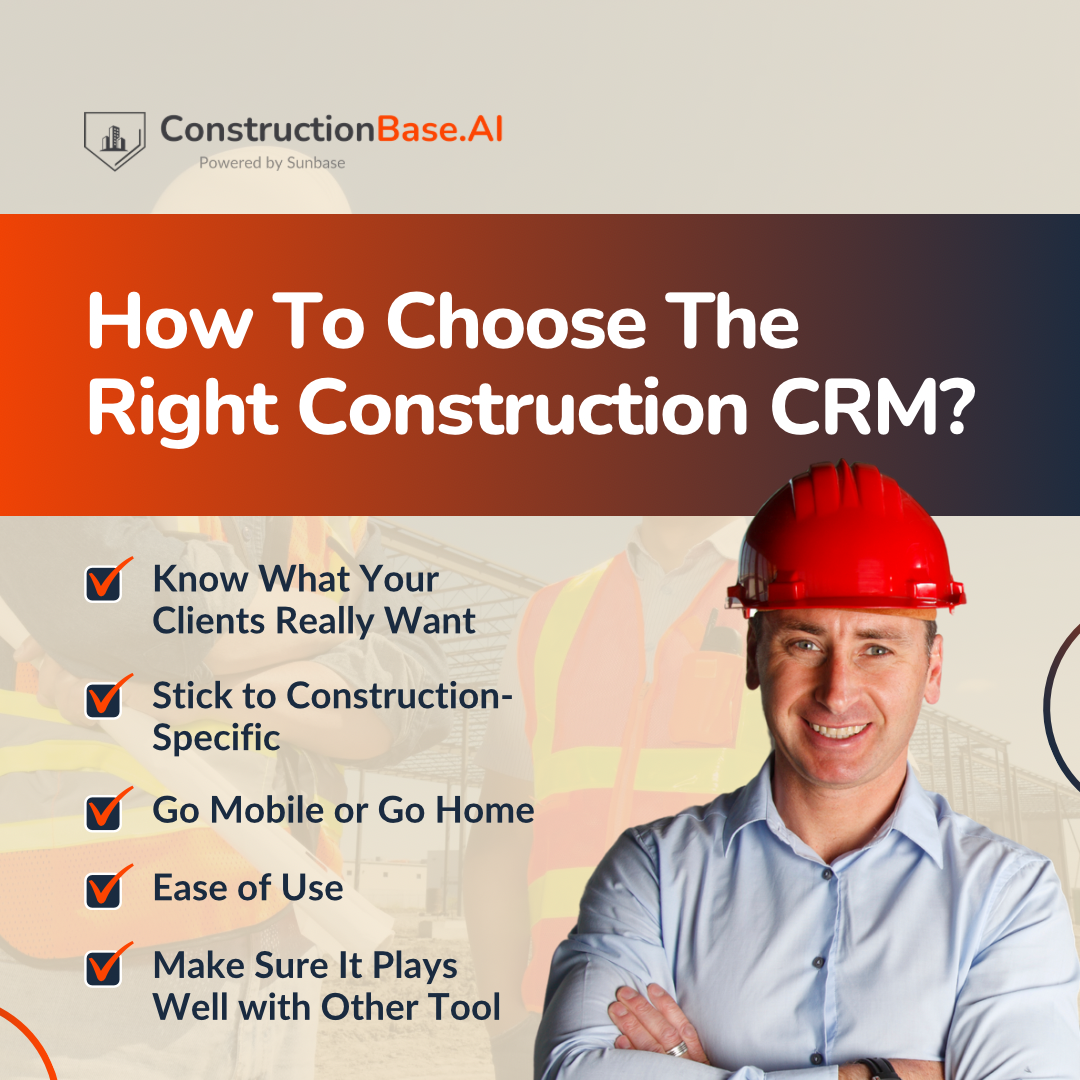
1. Know What Your Clients Really Want
Before anything, think: what would make your clients happier?
Quick updates? Smooth communication?
Choose a CRM for construction that helps you give real-time updates on job progress and keeps your clients informed.
2. Stick to Construction-Specific
Not every CRM gets the construction process.
Look for one made for construction businesses. It should simplify project planning, document management, and client communication.
3. Go Mobile or Go Home
If your CRM isn’t mobile-friendly, it’s a no.
You need one that can help you access right from the job site, share instant job progress updates, and keep clients in the loop, no matter where you are.
Real-time communication = stronger, happier customer relationships.
4. Ease of Use
The CRM should be user-friendly and easy to adopt for your team.
Look for intuitive interfaces and good customer support.
5. Make Sure It Plays Well with Other Tools
Pick the one that easily connects with your accounting software, scheduling apps, and project management tools.
When everything works together, updates are faster, communication is smoother, and clients stay better informed, which keeps them happy and trusting you more.
6. Scalability
Pick a CRM that can grow as your business grows.
It should be able to handle increasing amounts of data and new features as your company expands.
7. Test It Out First
Most CRM providers offer free trials or demos. Please don’t skip them!
Try it out to see if it fits your construction business, helps your sales process, and makes managing projects and client relationships easier.
Conclusion
To build better client relationships, you must be organized and stay personal.
A good CRM makes tracking what matters to each client easy, so you can show them you care.
When you do that, building trust becomes a whole lot easier.
About Constructionbase
They will remember what you built. But they will rave about how you made them feel. Let Constructionbase CRM help you be that builder.
Frequently Asked Questions
1. What is a builder’s pipeline CRM, and how can it help my business?
A builder's pipeline CRM helps general contractors track leads, projects, and client interactions. It gives you a clear overview of your sales process and helps with business development.
2. How does a CRM reduce manual data entry?
By automating data collection and entry, a CRM eliminates the need for manual data entry, saving time and reducing human error, so you can focus on building stronger relationships.
3. How can a CRM help with financial management in construction projects?
A CRM can track project budgets, payments, and financial milestones, helping general contractors monitor cash flow and ensure that financial management stays on track.
4. How does a centralized system improve project management for construction firms?
A centralized system helps construction firms with detailed project tracking, pipeline management, and faster team updates.
Have questions or need personalized advice?
Talk to an Expert Today and let our construction specialists guide you to success.



